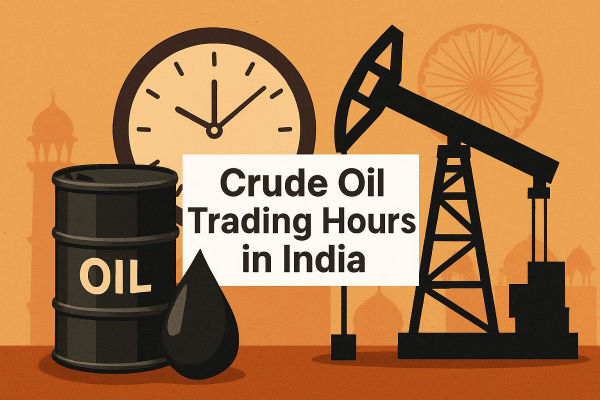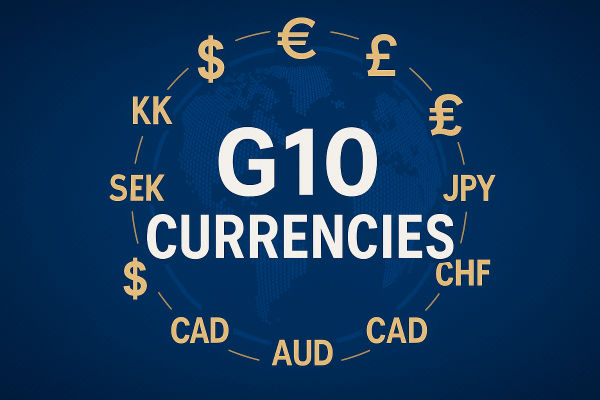If you trade crude oil from India, you'll primarily follow the MCX Crude Oil hours, which trade from Monday to Friday, 9:00 AM to 11:30 PM IST (extended to 11:55 PM during the U.S. daylight-saving window).
Global benchmarks (WTI and Brent) operate nearly 24 hours with brief maintenance pauses, as crucial U.S. inventory reports come in during Indian evenings and frequently induce the largest fluctuations.
Therefore, understanding exchange hours, contract specifications, inventory schedules, and session overlaps is crucial for selecting optimal trading times and managing risk.
Crude Oil Trading Time in India Traders Must Know
| Market / Contract |
Trading Session (IST) |
Days Open |
| MCX Crude Oil |
9:00 AM – 11:30 PM (Standard) / 9:00 AM – 11:55 PM (US Daylight Saving Time) |
Monday – Friday |
| WTI Crude Oil |
6:00 AM – 5:00 AM (next day) |
Monday – Friday |
| Brent Crude Oil |
6:30 AM – 5:30 AM (next day) |
Monday – Friday |
1. WTI (West Texas Intermediate)
WTI futures are traded for almost 23 hours daily (via electronic trading), with a brief maintenance period. Contract size is 1,000 barrels, and minimum tick is $0.01 per barrel (i.e., $10 per contract). WTI liquidity reaches its highest point during the U.S. trading hours and when London and New York overlap.
2. Brent
Brent futures are the Atlantic-basin benchmark and trade with extensive global hours. The agreement consists of 1,000 barrels, and the tick size is $0.01 for each barrel (worth $10).
Brent's liquidity reaches its highest point during London trading hours and the overlap of European and U.S. markets.
MCX Trading Hours
The Multi Commodity Exchange (MCX) operates commodity futures Monday through Friday in two sessions: a morning session and an evening session.
MCX regular hours are from 9:00 AM to 11:30 PM IST during the U.S. daylight saving time (typically March–November). The exchange extends the evening session to 11:55 PM IST to improve alignment with global markets.
This schedule aligns with key global hours when energy markets are active, allowing traders to access the most significant price changes during their local trading day.
Best Times to Trade Crude Oil in India

If you trade crude from India, use time windows that combine liquidity and news flow. These are the consistently best windows:
1. Evening Overlap (≈ 6:00 PM to 11:30/11:55 PM IST)
This window covers the New York open and the London late session overlap. Liquidity, tight spreads, and substantial institutional flow create optimal conditions for intraday breakouts, momentum trades, and responding to U.S. macro data.
MCX's evening session (5:00 PM onward) sits right in this block, so execution quality is generally good.
Trading Strategy: Intraday Momentum
Trade breakouts after confirming volume. Use 5–15 minute charts, set clear stop losses (ATR-based), and avoid news seconds.
2. Economic-Data Nights
The API weekly bulletin is typically released Tuesday evening U.S. time (which is late night / early morning in India, depending on DST). The EIA Weekly Petroleum Status Report is released Wednesdays at 10:30 AM ET, which converts to ~8:00 PM IST during DST, precisely when the evening session is active.
These releases often trigger moves in minutes; therefore, plan entries, use defined stops, and expect increased slippage.
Trading Strategy: News Scalping Around the EIA Release
Unless you are an experienced news trader, avoid holding aggressive directional positions through EIA. If you trade it, use limit entries to avoid chasing spikes and be ready for fast whipsaws.
3. Early Morning Tokyo/Asia Session (≈ 4:00 AM to 10:00 AM IST)
Liquidity during the Asian session is less than that of London/New York, yet significant regional demand news and Asian refining statistics can influence prices. This session is better for range traders and cautious scalpers.
Trading Strategy: Range Trading
Use support/resistance with oscillators (RSI/Stochastics). Maintain narrow stops and reduced size, as liquidity may disappear.
Why Timing Matters for Crude-Oil Traders in India?

Crude oil is probably the world's most macro-sensitive commodity: prices react to inventories, refinery throughput, OPEC/OPEC+ decisions, geopolitical events and currency movements. That means when you trade, it is almost as important as what you trade.
For example:
Weekly Inventory Reports: API often moves markets immediately; EIA is the official and usually more market-moving release. Indian traders must monitor these times as inventory surprises can cause volatility spikes and overnight gaps.
OPEC/OPEC+ Meetings: Announced production decisions can push prices sharply; coverage usually occurs during European business hours and is digested in the evening IST window.
Geopolitical Shocks: Conflicts, sanctions or Red Sea disruptions can cause sustained price jumps as these events are unpredictable and may trigger trading halts/limits.
Frequently Asked Questions
Q1. Can I Trade Crude Oil in India After Stock Market Hours?
A: Yes. Crude oil trading continues well beyond NSE/BSE stock market hours, allowing traders to participate in evening and late-night sessions.
Q2. Is Crude Oil Trading Available on Saturdays and Sundays in India?
A: No. Crude oil trading is only available Monday to Friday, as the global commodities market is closed on weekends.
Q3. Can I Trade Crude Oil in India Using a Forex Broker Instead?
A: Yes, but only through international forex brokers offering commodities CFDs.
Conclusion
In conclusion, the crude oil markets operate virtually 24 hours globally. The optimal time for Indian traders is during the evening session when global benchmarks and U.S. macroeconomic data enhance liquidity and momentum.
However, excelling in crude trading timing involves more than simply monitoring a clock. It necessitates combining exchange hours, contract calculations (lot & tick), news timing, and strict risk management.
Disclaimer: This material is for general information purposes only and is not intended as (and should not be considered to be) financial, investment or other advice on which reliance should be placed. No opinion given in the material constitutes a recommendation by EBC or the author that any particular investment, security, transaction or investment strategy is suitable for any specific person.



























